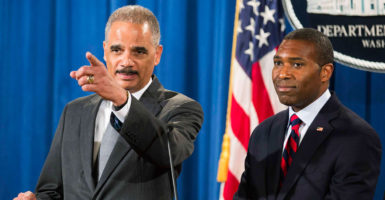Legislation to codify the U.S. attorney general’s recent ban on diverting millions in legal settlements to outside groups is now in the Senate’s court, following last week’s House action.
The Justice Department practice, widely criticized as a $1 billion “slush fund” benefiting liberal advocacy groups in the last 30 months of the Obama administration alone, would be outlawed under the House bill.
Sen. James Lankford, R-Okla., is the sponsor of the Senate version of legislation to prohibit U.S. government officials from creating and enforcing settlement agreements with corporations and other entities that steer funds in the form of donations to third-party, special-interest groups.
Lankford, who introduced his bill in February, co-sponsored similar legislation last year.
The Obama administration reached settlement agreements with financial institutions at the epicenter of the 2007-2008 financial crisis, when financial agreements known as mortgage-backed securities imploded.
>>> Related: Obama Justice Department’s ‘Slush Fund’ Boosted Liberal Groups
Financial institutions that entered into settlements with the Obama Justice Department included Bank of America Corp., Citigroup Inc., Goldman Sachs Group Inc., and JPMorgan Chase.
A joint investigation by the House Judiciary and Financial Services committees pried loose internal documents on the Justice Department practice during the administrations of Presidents Barack Obama and George W. Bush.
In a June 5 memorandum to every U.S. attorney and each major component of the Justice Department, Attorney General Jeff Sessions revised settlement policy to bar the practice of making payments to third parties that aren’t directly victimized in a particular case.
The House bill, sponsored by Judiciary Chairman Bob Goodlatte, R-Va., and passed Oct. 24 by a vote of 238-183, would make clear that settlement funds go to the U.S. Treasury, as would the Senate bill.
“An investigation by the House Judiciary Committee last Congress revealed the Department of Justice’s abuse of power: using settlement agreements to direct money away from victims toward organizations of their choosing and away from those they disliked,” Goodlatte said, adding:
DOJ’s actions contradict the spending power given explicitly to the legislative branch and undermine Congress’ most effective tool to hold the executive branch accountable. Regardless of which party is in the White House, subverting Congress to funnel money to outside organizations is unacceptable and unconstitutional.
>>> Commentary: How Jeff Sessions Stopped the Justice Department From Robbing the Public
As Heritage Foundation expert Paul Larkin, one of several government watchdogs to expose the practice, wrote in June of Sessions’ move to end the practice:
It might seem strange to see a headline stating that the U.S. attorney general has stopped the Justice Department from robbing the public, but that is exactly what [Sessions] just did. …
Federal law [already] requires Justice Department lawyers to deposit funds they receive from a settlement into the U.S. Treasury so that Congress, not the president or the Justice Department, can decide how those funds should be spent.
The internal documents obtained by the House committees included email records showing Justice Department staff working under then-Associate Attorney General Tony West went to great lengths not only to direct settlement funds to favored special-interest groups, but to deliberately exclude conservative groups from receiving funds.
West is now executive vice president for government affairs, general counsel, and corporate secretary of PepsiCo Inc. He has not responded to The Daily Signal’s request for comment.
“The responsibility of the power of the purse falls solely on Congress, and we should have authority to direct the funding of settlement agreements, not the executive branch’s special interest,” Lankford said in introducing the Senate bill.
“This bill will provide more transparency to the American people and stop the Department of Justice from circumventing the transparent appropriations process in Congress,” the Oklahoma Republican added.
Public records of settlement agreements with the Justice Department show that when cash donations to liberal groups are combined with other donations in the form of loans and a separate settlement with Volkswagen of America Inc., the “slush fund” may have topped $3 billion.
Pacific Legal Foundation, a nonprofit public interest law firm headquartered in Sacramento, California, was among conservative groups that the Obama Justice Department deliberately exclude from receiving settlement funds.
In an email dated July 9, 2014, a senior Justice official on West’s team explains how the draft of a mandatory donation provision was rephrased for the purpose of “not allowing Citi to pick a statewide intermediary like the Pacific Legal Foundation [PLF].”
The official identified the foundation as a group that “does conservative property-rights free legal services.”
“We are flattered that the previous administration would be concerned enough about our success vindicating individual liberty and property rights to prevent settlement funds from making their way to Pacific Legal Foundation,” Steven D. Anderson, the foundation’s CEO, said in an Oct. 24 statement.
In a press release on the House action last week, Pacific Legal Foundation also said:
No administration should be able to circumvent the constitutional appropriation power [of Congress] and steer settlement funds to favored nonprofit groups. It not only raises serious constitutional concerns, it’s too tempting to those who would abuse power for ideological or other personal ends. Permanent reforms to prevent such abuse are needed.
In the wake of the subprime mortgage crisis, all of the funds from the $2.5 billion [Citigroup] settlement should have gone to identifiable victims or taxpayers, via the Treasury. That same principle of law should apply to all settlements with the federal government.
The legislation in the House and Senate would end the practice permanently so that it could not be reinstituted under a future administration.
Original co-sponsors of the Senate bill, all Republicans, include John Cornyn and Ted Cruz of Texas, Orrin Hatch and Mike Lee of Utah, Jeff Flake of Arizona, Mike Crapo of Idaho, and Ron Johnson of Wisconsin.
Ken McIntyre contributed to this report.



























